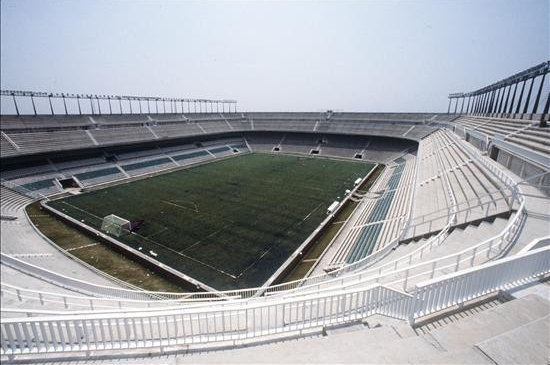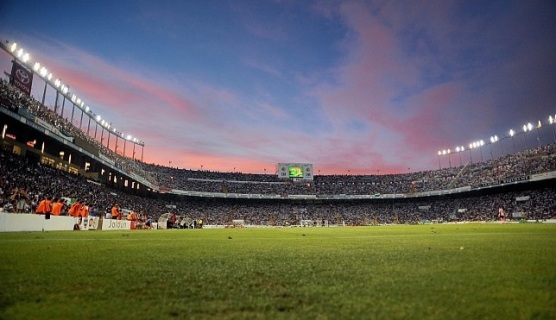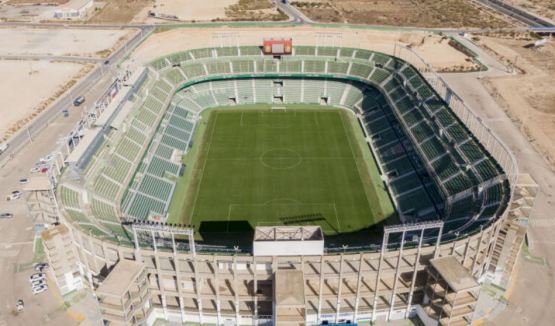Okay, the story so far… The town of Elche and its football club are on the up and progressive president Manuel Martinez Valero wants to move the club to a new stadium. What could go wrong? Well, quite a bit actually. For starters, the local municipality would not allow the whole of the Campo de Altabix site to be developed, nor would they contribute to the purchase of the land for the new stadium. A government grant failed to materialise and the president’s plan to part-finance the stadium by selling parking spaces raised little in the way of hard cash.

Manuel Martinez Valero was made of stern stuff, however. Having purchased land to the east of the town for 29 million pesetas and commissioned architect Juan Boix Matarredona, he commenced building in the autumn of 1974, even though planning permission had not been granted. This risked a heavy fine, but he knew that the city was continuing to grow and that this new stadium would have 300,000 potential customers on its doorstep before the end of the decade. He also boldly forecast that the stadium would host a World Cup. Foresight indeed.

So with building underway and the club back in the top flight following a brief drop into La Segunda, thoughts turned to the naming of the new stadium. “Nou Altabix” was a front-runner and “La Palmeral” or The Palms (You can’t go 20 yards with bumping into one in Elche) was also favoured. In total 17 names were put forward and the local newspaper ran a ballot, which resulted in the rather anodyne “Nou Estadio” coming out on top. The stadium was only named after the erstwhile president posthumously in 1988. Elche’s Nou Estadio opened on the 8 September 1976 with the president’s wife kicking-off a friendly match against the Mexican national team. On opening, the stadium featured one double-decked stand, but the remaining upper tiers were unfinished. It held 28,000 and was certainly more spacious than Altabix, but it could also be argued that it had arrived at least 5 years too late. Elche CF’s peak had occurred in the late sixties and the impressive stadium was not being matched by the form on the pitch.

The first season in their new home saw a mid-table finish of eleventh, but the 1977-78 season saw the club finish 17th and be relegated to La Segunda. In fact, since moving the club has spent only 8 of the last 37 seasons in La Primera, and more worryingly, just as many in the third tier. After 14 consecutive seasons in La Segunda, Elche finally secured their first promotion to La Primera since the late 1980s, and only their second Segunda title, in May 2013. The stadium attracted a healthy average attendance of 15,000 during the promotion season and witnessed a couple of sell-out fixtures as promotion beckoned. It may have taken a quarter of a century, but La Primera was all the better for the return of Elche CF & the Estadio Manuel Martinez Valero. Alas, despite finishing outside of the relegation placings for two seasons in a row, the club was demoted to La Segunda thanks to the new rulings on financial mismanagement.

The stadium has also seen its fair share of international football, starting with the 1982 World Cup. In preparation for the event, the Nou Estadio underwent a face-lift, just 3 years after it opened. The government money finally arrived, and whilst some questioned the wisdom in extending an already spacious stadium, the upgrade saw the upper tiers complete which took the overall capacity to 53,000. Elche staged three matches featuring Belgium, El Salvador and Hungary, but the overall attendance was poor. However, some of those who did attend witnessed history in the making, when the rampant Magyars trounced El Salvador 10-1. La Selección matches have in the main, attracted a full house, and their 6 visits to Elche have all resulted in home wins. The stadium also had the honour of staging the final of Copa del Rey in June 2003, when RCD Mallorca beat Recreativo Huelva 3-0.

The Estadio Manuel Martinez Valero is one of those stadiums that have won me over. Aesthetically, it is just a big, rather featureless bowl that would not look out of place in the top division of any European or South American league. It also features La Liga’s biggest pitch ( 108m x 70m). The fact that it has seen very little top flight football, sort of adds to its appeal, as does the story of Martinez Valero’s determination to get it built in the first place. It is now decked out with dark green with the club crest & name prominent on the east stand. Seating throughout the stadium has reduced capacity to 33,732. Simon Inglis in his book The Football Grounds of Europe felt that a smaller stadium would have suited the club and the city better, saying that it was a case of the shoemaker getting too big for his boots! However, doing it the easy way just wasn’t Manuel Martinez Valero’s style and the story of Elche CF is all the better for it.
